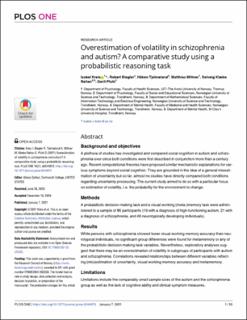Overestimation of volatility in schizophrenia and autism? A comparative study using a probabilistic reasoning task
Kreis, Isabel Viola; Biegler, Robert; Tjelmeland, Håkon; Mittner, Matthias; Reitan, Solveig Merete Klæbo; Pfuhl, Gerit
Peer reviewed, Journal article
Published version

Åpne
Permanent lenke
https://hdl.handle.net/11250/2728633Utgivelsesdato
2021Metadata
Vis full innførselSamlinger
- Institutt for matematiske fag [2435]
- Institutt for psykisk helse [1221]
- Institutt for psykologi [3066]
- Publikasjoner fra CRIStin - NTNU [37963]
Originalversjon
10.1371/journal.pone.0244975Sammendrag
Background and objectives
A plethora of studies has investigated and compared social cognition in autism and schizophrenia ever since both conditions were first described in conjunction more than a century ago. Recent computational theories have proposed similar mechanistic explanations for various symptoms beyond social cognition. They are grounded in the idea of a general misestimation of uncertainty but so far, almost no studies have directly compared both conditions regarding uncertainty processing. The current study aimed to do so with a particular focus on estimation of volatility, i.e. the probability for the environment to change.
Methods
A probabilistic decision-making task and a visual working (meta-)memory task were administered to a sample of 86 participants (19 with a diagnosis of high-functioning autism, 21 with a diagnosis of schizophrenia, and 46 neurotypically developing individuals).
Results
While persons with schizophrenia showed lower visual working memory accuracy than neurotypical individuals, no significant group differences were found for metamemory or any of the probabilistic decision-making task variables. Nevertheless, exploratory analyses suggest that there may be an overestimation of volatility in subgroups of participants with autism and schizophrenia. Correlations revealed relationships between different variables reflecting (mis)estimation of uncertainty, visual working memory accuracy and metamemory.
Limitations
Limitations include the comparably small sample sizes of the autism and the schizophrenia group as well as the lack of cognitive ability and clinical symptom measures.
Conclusions
The results of the current study provide partial support for the notion of a general uncertainty misestimation account of autism and schizophrenia.
